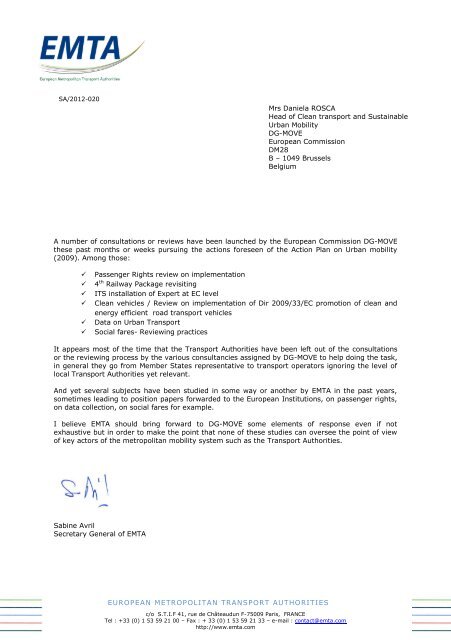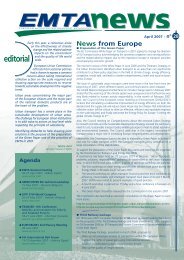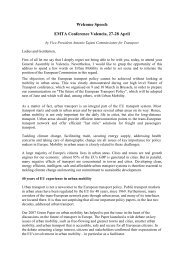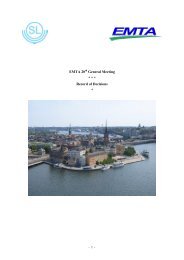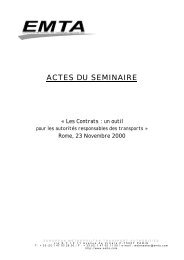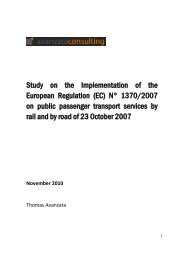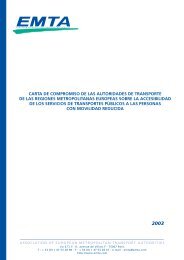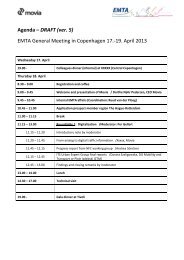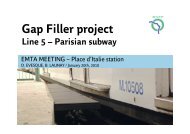EUROPEAN METROPOLITAN TRANSPORT AUTHORITIES ... - EMTA
EUROPEAN METROPOLITAN TRANSPORT AUTHORITIES ... - EMTA
EUROPEAN METROPOLITAN TRANSPORT AUTHORITIES ... - EMTA
You also want an ePaper? Increase the reach of your titles
YUMPU automatically turns print PDFs into web optimized ePapers that Google loves.
SA/2012-020<br />
Mrs Daniela ROSCA<br />
Head of Clean transport and Sustainable<br />
Urban Mobility<br />
DG-MOVE<br />
European Commission<br />
DM28<br />
B – 1049 Brussels<br />
Belgium<br />
A number of consultations or reviews have been launched by the European Commission DG-MOVE<br />
these past months or weeks pursuing the actions foreseen of the Action Plan on Urban mobility<br />
(2009). Among those:<br />
<br />
<br />
<br />
<br />
<br />
<br />
Passenger Rights review on implementation<br />
4 th Railway Package revisiting<br />
ITS installation of Expert at EC level<br />
Clean vehicles / Review on implementation of Dir 2009/33/EC promotion of clean and<br />
energy efficient road transport vehicles<br />
Data on Urban Transport<br />
Social fares- Reviewing practices<br />
It appears most of the time that the Transport Authorities have been left out of the consultations<br />
or the reviewing process by the various consultancies assigned by DG-MOVE to help doing the task,<br />
in general they go from Member States representative to transport operators ignoring the level of<br />
local Transport Authorities yet relevant.<br />
And yet several subjects have been studied in some way or another by <strong>EMTA</strong> in the past years,<br />
sometimes leading to position papers forwarded to the European Institutions, on passenger rights,<br />
on data collection, on social fares for example.<br />
I believe <strong>EMTA</strong> should bring forward to DG-MOVE some elements of response even if not<br />
exhaustive but in order to make the point that none of these studies can oversee the point of view<br />
of key actors of the metropolitan mobility system such as the Transport Authorities.<br />
Sabine Avril<br />
Secretary General of <strong>EMTA</strong><br />
<strong>EUROPEAN</strong> <strong>METROPOLITAN</strong> <strong>TRANSPORT</strong> <strong>AUTHORITIES</strong><br />
c/o S.T.I.F 41, rue de Châteaudun F-75009 Paris, FRANCE<br />
Tel : +33 (0) 1 53 59 21 00 – Fax : + 33 (0) 1 53 59 21 33 – e-mail : contact@emta.com<br />
http://www.emta.com<br />
1
On Passenger Rights<br />
Background:<br />
DG-MOVE launched a study on passenger rights in urban public transport early this year running<br />
until September 2012. The contracted consultancy firm Grimaldi E Associati is investigating the<br />
state-of-the-art in the field as well as the possible charters and/or service guaranties that public<br />
transport systems offer.<br />
A questionnaire has been drafted. Thanks to UITP EuroTeam, the information has been circulated.<br />
UITP also drafted a response. The questionnaire targeted two sectors: the transport operators and<br />
the transport users’ association.<br />
<strong>EMTA</strong> thinks that some key actors have been overlooked in the process and namely the Transport<br />
Authorities. The subject of Passenger Rights in Urban Transport is an on-going concern for <strong>EMTA</strong><br />
who organised in the Spring 2010 in Budapest a hearing with the participation of the European<br />
Passenger Federation EPF and the European Centre of Employers and Enterprises providing public<br />
services CEEP.<br />
The conclusions of the debate have been published and sent to the European Parliament TRAN<br />
Committee and the European Commission DG-MOVE in May 2010.<br />
<strong>EMTA</strong> is pleased to share again with DG-MOVE and the Consultancy firm Grimaldi E Associati “The<br />
Conclusions after passenger rights hearing15-16 April 2010” (see Annex I)<br />
************<br />
On Revisiting the 4 th railway package with possible impact on Regulation 1370/2007<br />
Background:<br />
The European Commission (EC) DG-MOVE organized a Conference on the PSO Regulation<br />
1370/2007 last November 14 2011 presenting the results of a survey conducted by the<br />
Consultancy firm DLA-Piper through the years 2010-2011 on the implementation of the<br />
Regulation.<br />
The survey pointed out several difficulties assorted with remarks and possible ways of solving.<br />
Following this Conference, and the conclusions of the survey, and taking advantage of preparing<br />
the ground for the revision of the 4th Railway Package tentatively scheduled to be issued in the<br />
Autumn 2012 and including several regulatory issues, DG-MOVE is considering including revisiting<br />
the PSO 1370/2007 Regulation, and to start with, Article 5.6 (see below) that defines the<br />
awarding scheme for railway transport contracts (Article 5.6 concerns regional and suburban<br />
trains. Metro and tram contracts are excluded).<br />
<strong>EMTA</strong> is organising a round table during its Spring 2012 General Assembly in Prague 24-25 May<br />
with the participation of the DG-MOVE Unit A5 Infringements and Legal matters to debate on the<br />
impact of the review of he 4 th Railway package on the implementation of the Regulation<br />
1370/2007.<br />
The conclusions of the round table will be drafted and forwarded to the DG-MOVE and the<br />
European parliament TRAN Committee.<br />
************<br />
<strong>EUROPEAN</strong> <strong>METROPOLITAN</strong> <strong>TRANSPORT</strong> <strong>AUTHORITIES</strong><br />
c/o S.T.I.F 41, rue de Châteaudun F-75009 Paris, FRANCE<br />
Tel : +33 (0) 1 53 59 21 00 – Fax : + 33 (0) 1 53 59 21 33 – e-mail : contact@emta.com<br />
http://www.emta.com<br />
2
On ITS installation of Experts at EC level.<br />
Background<br />
Persuant to Directive 2010/40/EU and in line with 2009 Action Plan, a new legal framework was<br />
adopted on 7 July 2010 to accelerate the deployment of innovative transport technologies.<br />
“Under this Directive, The European Commission has to adopt within the next seven years<br />
specifications (functional, technical, organisational or services provisions) to address the<br />
compatibility, interoperability and continuity of ITS solutions across the EU.”<br />
The new European ITS Advisory Group was created on 27 January 2012.<br />
The task of the European ITS advisory Group is to advise the Commission on business and<br />
technical aspects of the deployment and use of ITS in the European Union. The group is composed<br />
of 25 members from relevant ITS services providers, associations of users, transport and facilities<br />
operators, manufacturing industry, social partners, professional associations, local authorities and<br />
other relevant fora.<br />
All members of this group can be found here at :<br />
http://ec.europa.eu/transparency/regexpert/detailGroup.cfm?groupID=2736<br />
However, <strong>EMTA</strong> shares the point of view of its colleagues from Vienna VOR the Transport Authority<br />
when saying “the great majority of the members of the advisory group (20 out of 25) come from<br />
the car, road and telecom industries. Positive exceptions are only the cities/regions of Warsaw,<br />
Lyon, London, the Swedish transport ministry and the Community of European railways. Intermodality<br />
is drastically underrepresented in this group. Yet we believe, that the ITS Advisory Group<br />
could bring valuable stimuli for a comprehensive ITS architecture in Europe”.<br />
But we think that the group as it has been established will lack this positive effect on inter-modality<br />
and <strong>EMTA</strong> wants to draw DG-MOVE attention on this misfortune and ask how could it be solved?<br />
************<br />
On the review on implementation of Directive 2009/33/EC “Promotion of clean and<br />
energy efficient road transport vehicles”<br />
With a view to prepare a monitoring report on the above Directive, DG-MOVE has commissioned<br />
the consultancy firms AEA and Transport and Environmental Policy Research TEPR to carry out a<br />
review on the (so far) early stages of implementation of Directive 2009/33/EC.<br />
A questionnaire has been elaborated and sent out to a wide range of stakeholders along with a call<br />
for city-case-studies on a volunteering basis.<br />
Although the questionnaire enquires some specific topics more related to the industrial sector,<br />
there are some answers or comments relevant for transport Authorities.<br />
Therefore <strong>EMTA</strong> is very pleased, thanks to Mr Ian Skinner from TEPR initiative, to share some data<br />
collected on the use of various type of fuels in the bus fleets across Europe. See chart Annex II<br />
with data from 2009.<br />
Hopefully some members of the network will be able to complete the TEPR questionnaire.<br />
Besides <strong>EMTA</strong> is pleased to announce the fore-coming workshop on “Metropolitan regions and their<br />
vehicles- how can <strong>EMTA</strong> network help achieving the EU climate goals?” to be held in Berlin Monday<br />
17 September in Berlin at the kind invitation of the Transport Authority VBB Berlin-Brandenburg.<br />
(Draft agenda will be sent by end of June).<br />
************<br />
<strong>EUROPEAN</strong> <strong>METROPOLITAN</strong> <strong>TRANSPORT</strong> <strong>AUTHORITIES</strong><br />
c/o S.T.I.F 41, rue de Châteaudun F-75009 Paris, FRANCE<br />
Tel : +33 (0) 1 53 59 21 00 – Fax : + 33 (0) 1 53 59 21 33 – e-mail : contact@emta.com<br />
http://www.emta.com<br />
3
On collecting data and statistics on urban transport<br />
Background<br />
The University of Leuven (KUL) and UITP have been commissioned by the EC DG-MOVE to carry<br />
out a study on “the harmonized collection of European data and statistics in the field of urban<br />
transport and mobility”.<br />
In this context, interviews with local authorities are conducted by UITP and KUL to explore more<br />
deeply the availability of and need for statistical data on urban transport. Information collected<br />
from international and national organisations will complement the interviews and be part of a final<br />
report with recommendations for EU level actions.<br />
<strong>EMTA</strong> Secretariat General has been interviewed by UITP in the Autumn 2011. The interview was<br />
based on the “Barometer” 1 outcomes a one of a sort publication <strong>EMTA</strong> has been issuing regularly<br />
since 2000.<br />
The aim of the Barometer is to present the most important figures of the socio-economic and<br />
transport contexts in the largest metropolitan areas across Europe.<br />
In spite of the methodological difficulties, by the way largely debated with UITP, related to<br />
differences across Europe in the cultural approach of defining indicators or providing access to the<br />
data on the one hand and trying to compare local circumstances by essence unique to each place,<br />
the report enables the reader to make comparisons and set out ratios thus providing a useful<br />
source of information.<br />
<strong>EMTA</strong> is pleased to announce the new edition of the Barometer (data 2009) will be issued by the<br />
Summer 2012.<br />
Previous editions of the Barometer are available at : http://www.emta.com/spip.php?article267<br />
************<br />
On social fares, reviewing practices.<br />
Background<br />
Following a Question posed at the European Parliament, the European Commission has been<br />
enquiring recently on the concessionary fare practices across Europe.<br />
The information has been relayed by UITP with some direct questions they put to selected<br />
transport authorities among which some <strong>EMTA</strong> members.<br />
The subject of tariff policy practices had been explored among <strong>EMTA</strong> network, particularly in 2010<br />
following the first consequences of the economic downturn, the document “Survey on social<br />
policies in transport fare systems” compared the practices of 14 Transport Authorities of the largest<br />
European capitals. It concluded that Concessionary fares were universal practices targeting various<br />
segment of the population (older people, youngsters and persons on low income) although the<br />
criteria to apply could vary significantly as well as the amount of rebate offered. It also pointed out<br />
that legal requirement to offer concessionary fares didn’t belong to the Transport Authorities which<br />
had no choice but to cover it and the arbitrage among equally relevant concessionary schemes<br />
(young people, persons on low income, older people) could be difficult and hamper a sound<br />
transport strategy.<br />
A European project AENEAS which came to a close in the spring 2011 AENEAS Attaining ENergy<br />
Efficient mobility in Ageing Society has explored with success the specific topic of mobility of the<br />
older segment of the populations across Europe. Besides inventorying various successful practices<br />
of alternatives to the use of private cars it also touched upon the pricing strategy of Public<br />
1 <strong>EMTA</strong> Barometer see http://www.emta.com/spip.php?article267<br />
<strong>EUROPEAN</strong> <strong>METROPOLITAN</strong> <strong>TRANSPORT</strong> <strong>AUTHORITIES</strong><br />
c/o S.T.I.F 41, rue de Châteaudun F-75009 Paris, FRANCE<br />
Tel : +33 (0) 1 53 59 21 00 – Fax : + 33 (0) 1 53 59 21 33 – e-mail : contact@emta.com<br />
http://www.emta.com<br />
4
Transport and how it impacts on older people’s choice. The article has been published by <strong>EMTA</strong> in<br />
the 2010 newsletter of the AENEAS project<br />
<strong>EMTA</strong> is pleased to forward<br />
- the synthesis of the survey see Annex III<br />
- the article “About tariff policy and older passengers in public transport see Annex IV<br />
************<br />
<strong>EUROPEAN</strong> <strong>METROPOLITAN</strong> <strong>TRANSPORT</strong> <strong>AUTHORITIES</strong><br />
c/o S.T.I.F 41, rue de Châteaudun F-75009 Paris, FRANCE<br />
Tel : +33 (0) 1 53 59 21 00 – Fax : + 33 (0) 1 53 59 21 33 – e-mail : contact@emta.com<br />
http://www.emta.com<br />
5


